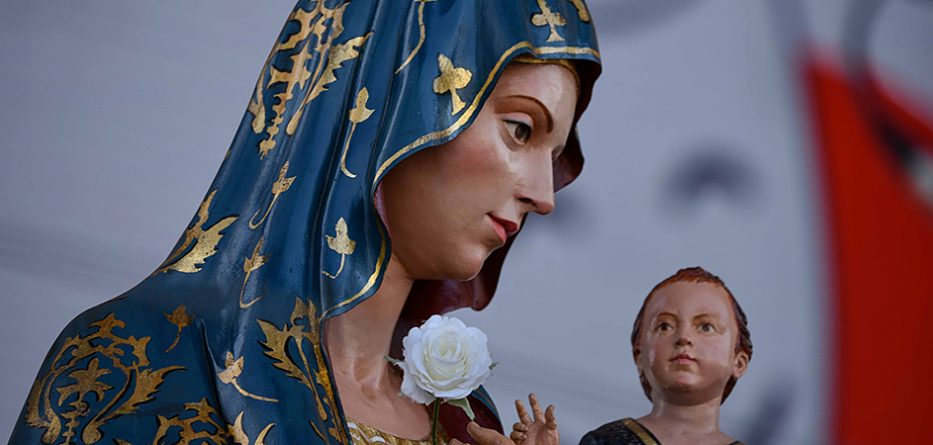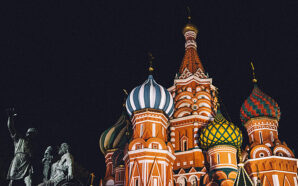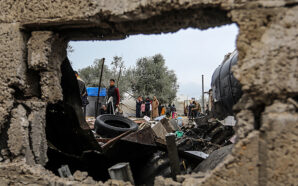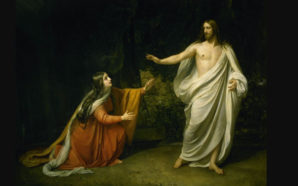Homily for Fifth Sunday of Easter Year A 2020
Readings: Acts 6:1-7; John 14: 1-12
10 May 2020
Happy Mother’s Day to all of you who are mothers.
Most of us count ourselves blessed with our mothers. We would not have been, without them. We would have been lost without them. We would not be who we are, nor have achieved what we have, without them. Today is a day simply to say, ‘Thank you’. With our physical distancing, we reach out to express our love for our mothers, and mothers take time to embrace their children by Zoom or whatever technology is on hand.
We know that the world is not perfect. Not all mothers are perfect. But in a broken world, we give thanks for our mothers who have held that world together for us, especially at the most precarious of times. Pope Francis has said, ‘In today’s fragmented world, when we risk losing our bearings, a mother’s embrace is essential.’
This is the first Mother’s Day for me without my mother. The fair Patricia died seven months ago, aged 91, a mother, grandmother, and great grandmother many times over.
LISTEN: https://soundcloud.com/frank-brennan-6/mothers-day-homily
At Mum’s funeral, one of my sisters Anne, herself a mother, and now a grandmother several times over, reflected:
‘I have the absolute privilege of talking about this wonderful woman, our mother. She was intelligent and curious. She was gentle and strong. She was so wise, yet humble. She had firm opinions but was open to new ideas and embraced change with interest and amazement. Her wit and, at times, irreverence were entertaining, genuine and endearing. Patricia Brennan was resilient. Her life was not always easy. It began happily but when Pat was aged 5 years, living in Mt Morgan Queensland, her young mother Rita Quinlan died. Two years later her young father, Dr Jo O’Hara died. 3 little orphans were separated.’
Having traced the contours of Mum’s rich life as doctor, wife and mother, Anne, also a doctor, went on to say: ‘The great legacy Mum leaves is her 7 well educated children with good lives. This didn’t happen by accident. All parents work hard but Mum worked tirelessly and yet made time to read, relax and play.’
‘What Mum loved most was just to be with those she loved, who will always love, honour and remember her.’
Not every mother’s life is blessed. And no mother’s whole life is blessed. No family is perfect, and mothers are inevitably caught in the centre of the mess. For many mothers, life brings great burdens and tragedy. Today we particularly remember those mothers who do it tough, particularly those who have endured the loss of a miscarriage, those who carry the burden of caring for a child with acute disabilities, and those who have known abuse and violence in the home. And we remember those who though not mothers have done much good mothering to nurture up-and-coming generations.
After his death, and ten years after he won the Nobel prize for literature, Seamus Heaney’s poem about his mum was voted Ireland’s favourite poem of the last 100 years:
When all the others were away at Mass
I was all hers as we peeled potatoes.
They broke the silence, let fall one by one
Like solder weeping off the soldering iron:
Cold comforts set between us, things to share
Gleaming in a bucket of clean water.
And again let fall. Little pleasant splashes
From each other’s work would bring us to our senses.
So while the parish priest at her bedside
Went hammer and tongs at the prayers for the dying
And some were responding and some crying
I remembered her head bent towards my head,
Her breath in mine, our fluent dipping knives–
Never closer the whole rest of our lives.
When he accepted the Nobel prize for literature, Heaney reminded us that poetry touches ‘the base of our sympathetic nature while taking in at the same time the unsympathetic nature of the world to which nature is constantly exposed’. He spoke of poetry’s ‘power to persuade that vulnerable part of our consciousness of its rightness in spite of the evidence of wrongness all around it, the power to remind us that we are hunters and gatherers of values, that our very solitudes and distresses are creditable, in so far as they, too, are an earnest of our veritable human being.’
We know the comfort of being in our mother’s arms at those times when our joys and hopes, our fears and anxieties are intimately shared and securely held . It’s been in the embrace of our mother’s unconditional love that right values have been taught, and our lives enriched.
Heaney’s poem is an expression of true mothering. It highlights the wonder of something so simple as being with Mum peeling the spuds, sharing and relating trustingly, secure in our sense of worth. This is how the foundation stones are laid for the best expression of ourselves and for the most fruitful relationships contributing to the good, the true and the beautiful in our world.
We remember those simple, most unlikely moments around the home when each of us had that time to be with our mother and for her to be so present to us. My sister Anne at Mum’s funeral reflected that the fair Patricia ‘had a unique strong relationship with each of us, to the point that, we each felt it was all about us, yet there were 6 others’. Being her first child, I’ve had the privilege since my orphan mother’s death of appreciating that there was one year, my first year of which I have no awareness, when I was probably the centre of her life and she the centre of mine.
In today’s gospel, Jesus mothers us in the best sense of the term when he says, ‘Do not let your hearts be troubled. Trust in God still, and trust in me. There are many rooms in my Father’s house’. Imagine the young Seamus alone with his mother, leaning over the bowl peeling the potatoes while the rest of the clan is off at Mass with Dad. Living in the north of Ireland during the worst of the troubles, Heaney then moved to the south always contemplating our troubled world, noting: ‘Only the very stupid or the very deprived can any longer help knowing that the documents of civilization have been written in blood and tears, blood and tears no less real for being very remote.’ He was always able to look back on that moment when his heart was not troubled, when his trust was unabated and when he knew that he belonged, there with his mum peeling the spuds. It culminated in the one line other than name and dates etched on his tombstone back in the north at Bellaghy, County Londonderry: ‘Walk on air against your better judgement’.
In today’s first reading from the Acts of the Apostles, there is tension between two groups in the expanding Christian community. There are always tensions – even, or especially, when Christians come together. The Hellenists thought that the Hebrews were short-changing their widows when it came to the distribution of the food. The Hellenists were probably Jews from the Diaspora who spoke Greek and who had returned to Jerusalem, worshipping with the locals who were Jews speaking Aramaic. The Hellenists prided themselves on having had some out of town experience. The Hebrews had that slight superiority as well as inferiority complex of those who have never ventured beyond the familiar. On the face of it, the tensions are resolved by the twelve calling together the disciples and having them elect seven helpers. Presumably only the disaffected Hellenists got to vote. All seven who are selected have Greek names. And guess what: two of them are Stephen and Philip who spend the next 3 chapters of the Acts of the Apostles doing anything but hanging around Jerusalem equitably distributing food to the widows. We don’t hear again about the other five.
Stephen and Philip take off, preaching the word with great gusto. Stephen fairly promptly gets stoned to death for his trouble, and Philip goes so far afield as to evangelise the Ethiopian eunuch on his way home. The most important parts of the mission were not being reserved to the Twelve. From the very beginning, new offices and new ways were created so that the word could get out to where it was needed. And so it should be for us, once we emerge from our Covid-19 lockdown, imagining new ways to be Church for each other, preparing for the forthcoming plenary council. Let’s foster and treasure those sacramental moments such as the times when young Seamus and his mum were not at mass, but alone together at home, just peeling the spuds.
One of my fondest memories of my mother’s last days when she had dementia was when I wheeled her in her wheelchair down to a park by Sydney Harbour. It was a glorious late spring day. The water was glistening. The sky was blue. The jacarandas were in full bloom. I bought her a coffee. When she’d finished, I asked, ‘How was the coffee?’ She replied, ‘Mediocre’. She then smiled, her eyes lit up, she lifted her hands, and looked around, exclaiming, ‘But this!’ There she was in the autumn of her life surrounded by the beauty of nature, in company with one of her own. She counted herself abundantly blessed. And she was.
May we all share a blessing with and from our mothers this day, no matter where they be.
Fr Frank Brennan SJ is the Rector of Newman College, Melbourne and the former CEO of Catholic Social Services Australia (CSSA).








